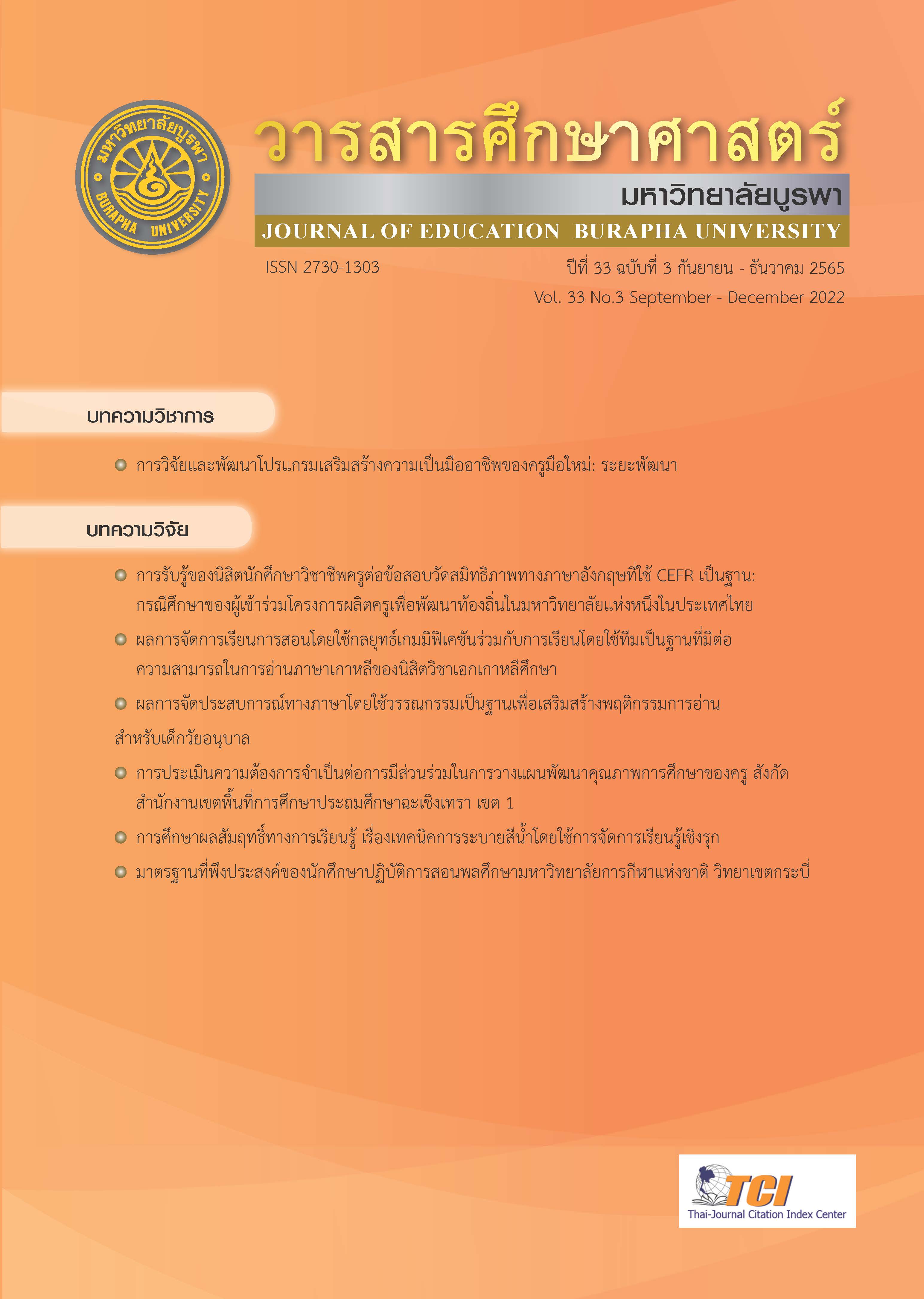PERCEPTION TOWARDS THE CEFR-BASED ENGLISH PROFICIENCY TEST: A CASE OF THE STUDENT-TEACHER IN THE TEACHER FOR LOCAL DEVELOPMENT PROJECT AT ONE UNIVERSITY IN THAILAND
คำสำคัญ:
Perception towards the test, Student-teacher, CEFR-based English Proficiency Testบทคัดย่อ
Every year, thousands of Thai student teachers, regardless of their majors, take the high-stakes English proficiency test to fulfill the requirements of the Teacher for Local Development Project. They need to obtain the minimum scores on the CEFR-based English proficiency tests to be appointed as in-service teachers. Given that it affects future careers, the CEFR-based English proficiency test becomes one of the most high-stakes tests for student teachers in Thailand. The aim of the present study was to determine the perception that student teachers in the Teacher for Local Development Project had regarding CEFR-based English proficiency tests. Employing an exploratory design, the questionnaire was used to collect data from an intact group of seventeen non-English major student teachers from one public university in Thailand. According to the result, the requirement of the CEFR-based English proficiency test had both positive and negative feedback among the participants. Their perceived levels of awareness and familiarity with the CEFR-based English proficiency test were at high and moderate levels, respectively. They also encountered challenges due to inadequate information about the test they were about to take in their final year of teacher education. A glimpse of the contradiction between the intention of the policy and the washback of the test was also surfaced. In light of the finding, the final section of this study discusses helpful recommendations for promoting a positive perception among student teachers, as well as future research directions.
เอกสารอ้างอิง
Office of the Higher Education Commission. (2017). การคัดเลือกเข้าร่วมโครงการผลิตครูเพื่อพัฒนา
ท้องถิ่น ปี พ.ศ. 2561 กรณีคัดเลือกนิสิตนักศึกษาครูชั้นปีที่ 5 ปีการศึกษา 2560.
Council of Europe (2001). Common European Framework of Reference for Languages:
Learning, Teaching, and Assessment. Council of Europe, Language Policy Unit: Strasbourg www.coe.int/lang-cefr
Council of Europe (2018). Common European Framework of Reference for Languages:
Learning, Teaching and Assessment, Companion Volume with New Descriptors Council of Europe, Language Policy Programme: Strasbourg www.coe.int/lang-cefr
Foley, J. (2019). Issues on Assessment using CEFR in the Region. LEARN Journal 12(2), 28 - 48.
Li, H., Zhong, Q. & Suen, H.K. Students' Perceptions of the Impact of the College English
Test. Language Testing in Asia 2, 77 (2012).
Tsagari, D. (2009). The complexity of test washback. Frankfurt am Main: Peter Lang.
Wu, J. & Lee, M. (2017). The relationships between test performance and students’
perceptions of learning motivation, test value, and test anxiety in the context of the English benchmark requirement for graduation in Taiwan’s universities. Language Testing in Asia 7(1).
Uri, M. (2021). CEFR in Malaysia: The Appropriacy of English syllabus and assessment,
stakeholders' perspectives and challenges. Unpublished Ph.D. thesis, Faculty of Social Sciences and Humanities, Universiti Kebangsaan Malaysia, Malaysia.
ดาวน์โหลด
เผยแพร่แล้ว
รูปแบบการอ้างอิง
ฉบับ
ประเภทบทความ
สัญญาอนุญาต
ลิขสิทธิ์ (c) 2022 ณัฏฐ์ธรรมา น้ำฟ้า

อนุญาตภายใต้เงื่อนไข Creative Commons Attribution-NonCommercial-NoDerivatives 4.0 International License.
ลิขสิทธิ์ของบทความที่ปรากฏในวารสารศึกษาศาสตร์ มหาวิทยาลัยบูรพา เป็นของวารสารศึกษาศาสตร์ มหาวิทยาลัยบูรพา ทั้งนี้บทความทุกเรื่องผ่านการตรวจสอบความถูกต้องทางวิชาการจากผู้ทรงคุณวุฒิ ข้อความและข้อมูลของบทความในวารสารฯ เป็นแนวคิดของผู้แต่ง มิใช่เป็นความคิดเห็นของกองบรรณาธิการ และมิใช่ความรับผิดชอบของคณะศึกษาศาสตร์ มหาวิทยาลัยบูรพา ไม่สงวนลิขสิทธิ์การนำไปใช้ประโยชน์ทางวิชาการแต่ต้องอ้างอิงแสดงแหล่งที่มาและอยู่ในขอบเขตของกฎหมายลิขสิทธิ์



